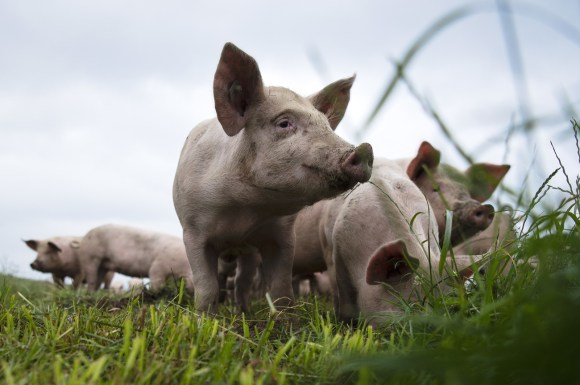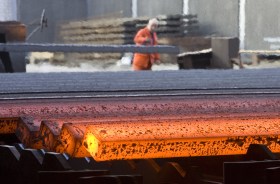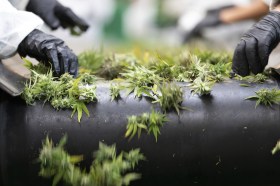
Vania Alleva, president of the Unia trade union.
Anthony Anex
Vania Alleva, the boss of Switzerland’s largest trade union, says wage discrimination should be eliminated before women are made to work longer. She wants voters to say ‘no’ to a reform of the old-age pension system on September 25.
Vania Alleva, the boss of Switzerland’s largest trade union, says wage discrimination should be eliminated before women are made to work longer. She wants voters to say ‘no’ to a reform of the old-age pension system on September 25.
This content was published on September 8, 2022 -
Katy Romy
After two previous reform efforts failed at the ballot box in 2004 and 2017, the Swiss are set to vote again on a proposal to revamp the pension system to ensure its financial viability.
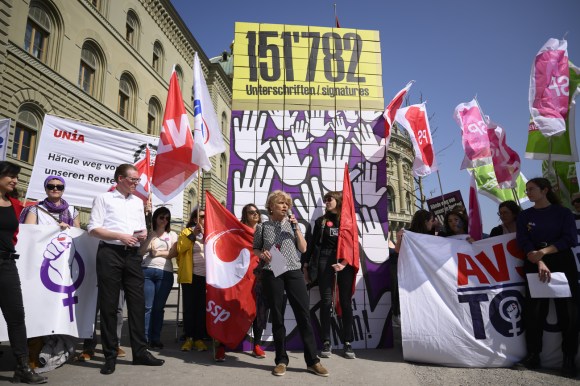
Women’s retirement age to be voted on again
Jul 29, 2022 Raising the retirement age for women remains a stumbling block.
The central plank of the reform is an increase in the retirement age for women from 64 to 65, putting them on an equal footing with men. Government, parliament, and parties from the right and centre all say this is a necessary measure. But the change provoked an outcry from the left and trade unions, who collected 150,000 signatures to force a referendum.
For Vania Alleva, the president of Switzerland’s largest trade union Unia, the reform is unacceptable.
SWI swissinfo.ch: Two attempts to reform the pension system have already failed. Can Switzerland afford to say ‘no’ again?
Vania Alleva: The pension system has no structural problems. It is solid, it has no liquidity issues. The latest results show this: last year, it made a profit of CHF2.6 billion ($2.64 billion). There is no need for this reform, which is at the expense of women.
SWI: But without reform the system will be in deficit from 2029 onwards, according to projections by the Federal Social Insurance Office. How would we continue to finance pensions?
V.A.: The authorities’ forecasts are too pessimistic. Every ten years, the government makes a mistake in its predictions, leaving it out by several billion francs. The system will certainly have to shoulder the retirement of the baby boomer generation. However, we can find other ways to solve this transitional problem, if we have to. It is a question of political will.
SWI: What solutions do the left and the unions propose to deal with this problem?
V.A.: First of all, existing wage discrimination must be eliminated. Beyond that, there are various ways of strengthening the first pillar [the state pension scheme], because in any case we need to increase pensions, which are currently too low. We have proposed a very concrete solution to achieve this: the Swiss National Bank initiative, a proposal to use the central bank’s billions of profits to boost the pension system.

Is it necessary to raise the retirement age for women, or are there other ways to secure pensions?
On September 25, Swiss citizens will decide whether to raise the retirement age for women from 64 to 65.
SWI: Most OECD countries have already increased the retirement age and eliminated the gender gap. Can Switzerland afford not to follow the international trend?
V.A.: We have to take into account the reality of the Swiss labour market, which is not rosy for older workers. People between the ages of 55 and 64 have the highest unemployment rates. And a report published at the end of 2021 by the State Secretariat for Economic Affairs showed that the number of 55 to 64-year-olds forced to leave the labour market altogether – due to disability, illness or lack of opportunity – increased between 2010 and 2020.
The situation is even more difficult in female-dominated professions like care work. A survey carried out by Unia before the pandemic showed that almost half of care workers think they will not be able to work until they reach retirement age. This shows that we can’t afford to increase the age even further. It would mean more unemployment.
SWI: The women most affected by this reform (born between 1961 and 1969) will benefit from compensation measures, in particular the possibility to retire as young as 62 with a smaller reduction in their pension. Are these measures not enough?
V.A.: This reform means losing a year’s pension, which will cost women CHF26,000, even though their pensions are already a third lower than men’s. The compensation measures are completely inadequate. We should also be aware that this dismantling of the pension system is just the first step towards raising the retirement age to 67 for everyone.
SWI: Pension inequality is mainly due to the second pillar (occupational pensions), not so much the first pillar (state-backed old-age pensions). Isn’t the left fighting the wrong battle?
V.A.: Not at all! It’s essential not to weaken the first pillar, which is the fairest and most balanced of the [three-pillar] system. It should rather be strengthened, because one in three women has no second pillar coverage and has to get by on the first. Of course, we also have to find solutions to slow down the decline in second-pillar payouts. Representatives of employees, employers and the government actually reached a compromise to reform the occupational pension scheme, but it was thrown out in parliament. That’s our next battle.
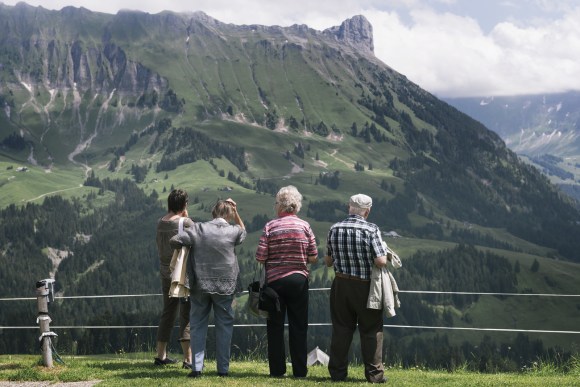
Switzerland mulls raising the retirement age for women
Mar 19, 2021 Like in many industrialised countries, Switzerland is trying to align the age of retirement between men and women.
SWI: A differentiated retirement age is the remnant of a patriarchal system, with the argument of the government in the last century being that women had a “physiological disadvantage” compared to men. Why should we preserve this old-fashioned model?
V.A.: What’s old-fashioned and unconstitutional is the fact that women continue to suffer big wage discriminations. They earn on average 19% less than men. Equal pay is enshrined in law, in the constitution, but we continue to avoid the problem. If these inequalities were ended, the money this reform wants to gain at the expense of women would flow naturally into the coffers of the pension system. It would be more profitable.
SWI: Still, many women support the reform. Isn’t it misleading for the left and the unions to use this as an argument for equality?
V.A.: Maybe the right-wing women who launched the campaign for reform have high salaries and no financial worries. Lawyers or university professors will be able to take a pension cut of CHF26,000. But women with low incomes and limited means will feel the full impact. Pensions for couples will also suffer.
SWI: Backers of the reform believe that allowing women to retire earlier is not a way to eliminate wage discrimination. Wouldn't it be better to increase their income and improve childcare, for example?
V.A.: We have been fighting discrimination and inequality for decades and will continue to do so. We did not have the support of women reform activists when it came to revising the Gender Equality Act or fighting for pay rises in professions where women are predominantly employed. These professions continue to be poorly paid, even though the pandemic has highlighted how important they are. All this has implications for old-age pensions. One in nine women has to claim supplementary benefits to get by in retirement. This problem must be solved first, rather than asking them to work longer to earn less.
SWI: The left and the unions also oppose the second part of the reform, an increase in value-added tax from 7.7% to 8.1%. But the measure would bring in around CHF1.4 billion per year to strengthen the pension system. Can we really do without this windfall?
V.A.: People already face rising prices, and a steep increase in health insurance premiums is expected in September. Against this backdrop, a VAT hike would be too heavy a burden on households. We are expected to pay more while our pensions are cut. It’s not acceptable.
Below: an opposing viewpoint from Brenda Duruz McEvoy, pensions expert at the employers’ association in canton Vaud.

Pensions vote: a yes would ‘help to eliminate inequalities’
Sep 8, 2022 The revamp of the pension system would boost the financial situation of retired women, says Brenda Duruz McEvoy.
Translated from French by Catherine Hickley/dos
After two previous reform efforts failed at the ballot box in 2004 and 2017, the Swiss are set to vote again on a proposal to revamp the pension system to ensure its financial viability.

Women’s retirement age to be voted on again
Jul 29, 2022 Raising the retirement age for women remains a stumbling block.
The central plank of the reform is an increase in the retirement age for women from 64 to 65, putting them on an equal footing with men. Government, parliament, and parties from the right and centre all say this is a necessary measure. But the change provoked an outcry from the left and trade unions, who collected 150,000 signatures to force a referendum.
For Vania Alleva, the president of Switzerland’s largest trade union Unia, the reform is unacceptable.
SWI swissinfo.ch: Two attempts to reform the pension system have already failed. Can Switzerland afford to say ‘no’ again?
Vania Alleva: The pension system has no structural problems. It is solid, it has no liquidity issues. The latest results show this: last year, it made a profit of CHF2.6 billion ($2.64 billion). There is no need for this reform, which is at the expense of women.
SWI: But without reform the system will be in deficit from 2029 onwards, according to projections by the Federal Social Insurance Office. How would we continue to finance pensions?
V.A.: The authorities’ forecasts are too pessimistic. Every ten years, the government makes a mistake in its predictions, leaving it out by several billion francs. The system will certainly have to shoulder the retirement of the baby boomer generation. However, we can find other ways to solve this transitional problem, if we have to. It is a question of political will.
SWI: What solutions do the left and the unions propose to deal with this problem?
V.A.: First of all, existing wage discrimination must be eliminated. Beyond that, there are various ways of strengthening the first pillar [the state pension scheme], because in any case we need to increase pensions, which are currently too low. We have proposed a very concrete solution to achieve this: the Swiss National Bank initiative, a proposal to use the central bank’s billions of profits to boost the pension system.

Is it necessary to raise the retirement age for women, or are there other ways to secure pensions?
On September 25, Swiss citizens will decide whether to raise the retirement age for women from 64 to 65.
SWI: Most OECD countries have already increased the retirement age and eliminated the gender gap. Can Switzerland afford not to follow the international trend?
V.A.: We have to take into account the reality of the Swiss labour market, which is not rosy for older workers. People between the ages of 55 and 64 have the highest unemployment rates. And a report published at the end of 2021 by the State Secretariat for Economic Affairs showed that the number of 55 to 64-year-olds forced to leave the labour market altogether – due to disability, illness or lack of opportunity – increased between 2010 and 2020.
The situation is even more difficult in female-dominated professions like care work. A survey carried out by Unia before the pandemic showed that almost half of care workers think they will not be able to work until they reach retirement age. This shows that we can’t afford to increase the age even further. It would mean more unemployment.
SWI: The women most affected by this reform (born between 1961 and 1969) will benefit from compensation measures, in particular the possibility to retire as young as 62 with a smaller reduction in their pension. Are these measures not enough?
V.A.: This reform means losing a year’s pension, which will cost women CHF26,000, even though their pensions are already a third lower than men’s. The compensation measures are completely inadequate. We should also be aware that this dismantling of the pension system is just the first step towards raising the retirement age to 67 for everyone.
SWI: Pension inequality is mainly due to the second pillar (occupational pensions), not so much the first pillar (state-backed old-age pensions). Isn’t the left fighting the wrong battle?
V.A.: Not at all! It’s essential not to weaken the first pillar, which is the fairest and most balanced of the [three-pillar] system. It should rather be strengthened, because one in three women has no second pillar coverage and has to get by on the first. Of course, we also have to find solutions to slow down the decline in second-pillar payouts. Representatives of employees, employers and the government actually reached a compromise to reform the occupational pension scheme, but it was thrown out in parliament. That’s our next battle.

Switzerland mulls raising the retirement age for women
Mar 19, 2021 Like in many industrialised countries, Switzerland is trying to align the age of retirement between men and women.
SWI: A differentiated retirement age is the remnant of a patriarchal system, with the argument of the government in the last century being that women had a “physiological disadvantage” compared to men. Why should we preserve this old-fashioned model?
V.A.: What’s old-fashioned and unconstitutional is the fact that women continue to suffer big wage discriminations. They earn on average 19% less than men. Equal pay is enshrined in law, in the constitution, but we continue to avoid the problem. If these inequalities were ended, the money this reform wants to gain at the expense of women would flow naturally into the coffers of the pension system. It would be more profitable.
SWI: Still, many women support the reform. Isn’t it misleading for the left and the unions to use this as an argument for equality?
V.A.: Maybe the right-wing women who launched the campaign for reform have high salaries and no financial worries. Lawyers or university professors will be able to take a pension cut of CHF26,000. But women with low incomes and limited means will feel the full impact. Pensions for couples will also suffer.
SWI: Backers of the reform believe that allowing women to retire earlier is not a way to eliminate wage discrimination. Wouldn't it be better to increase their income and improve childcare, for example?
V.A.: We have been fighting discrimination and inequality for decades and will continue to do so. We did not have the support of women reform activists when it came to revising the Gender Equality Act or fighting for pay rises in professions where women are predominantly employed. These professions continue to be poorly paid, even though the pandemic has highlighted how important they are. All this has implications for old-age pensions. One in nine women has to claim supplementary benefits to get by in retirement. This problem must be solved first, rather than asking them to work longer to earn less.
SWI: The left and the unions also oppose the second part of the reform, an increase in value-added tax from 7.7% to 8.1%. But the measure would bring in around CHF1.4 billion per year to strengthen the pension system. Can we really do without this windfall?
V.A.: People already face rising prices, and a steep increase in health insurance premiums is expected in September. Against this backdrop, a VAT hike would be too heavy a burden on households. We are expected to pay more while our pensions are cut. It’s not acceptable.
Below: an opposing viewpoint from Brenda Duruz McEvoy, pensions expert at the employers’ association in canton Vaud.

Pensions vote: a yes would ‘help to eliminate inequalities’
Sep 8, 2022 The revamp of the pension system would boost the financial situation of retired women, says Brenda Duruz McEvoy.
Translated from French by Catherine Hickley/dos



